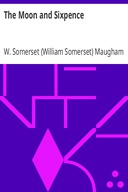In "Moon and Sixpence," Somerset Maugham takes a fascinating look into the life of Charles Strickland, a man who gives up his comfortable life as a stock broker, breaks the social contract, abandons his family, and takes up painting. These changes condemn him to a life of poverty and disdain by most who know him. The story is related by an aspiring writer who never seems to be able to quite get the painter to admit he is either remorseful of all the human wreckage he's left in his wake, or so uncomfortable in this new life that he's sorry for having made such a hash of his it. "Moon and Sixpence" raises several interesting questions: Who makes the social contract anyway, and did Strickland knowingly sign on, or was he simply incorporated into it by society? Would it have been acceptable for Strickland to abandon his family to become a priest, missionary, or some other more acceptable form of profession? While the book is loosely based on the life of Paul Gaugin, it is really more about W. Somerset Maugham and his search for beauty and truth. Maugham shows us that while the search may be noble, the journey is not necessarily beautiful to everyone, especially those not involved. "Moon and Sixpence" is a must-read for anyone contemplating a life in the arts. While Strickland is a thoroughly dislikable character, he is one without artifice, totally lacking the ability to say anything other than what is true to him. He is a man consumed by his passion, completely lacking the need for approval. Maugham as usual creates a work that is both powerful and thought-provoking. "Moon and Sixpence" satisfys on at least two levels; as an excellent story, and as a philosophical treatise on art, beauty and passion.


